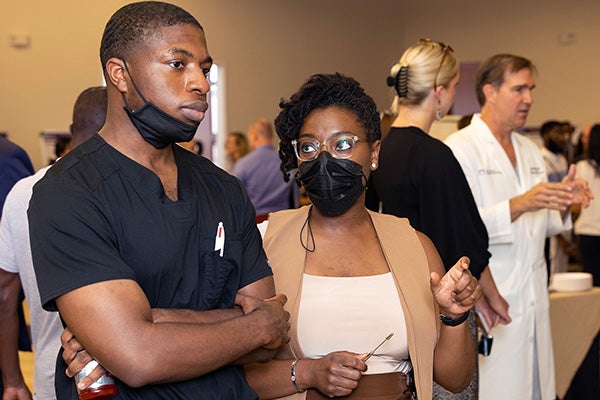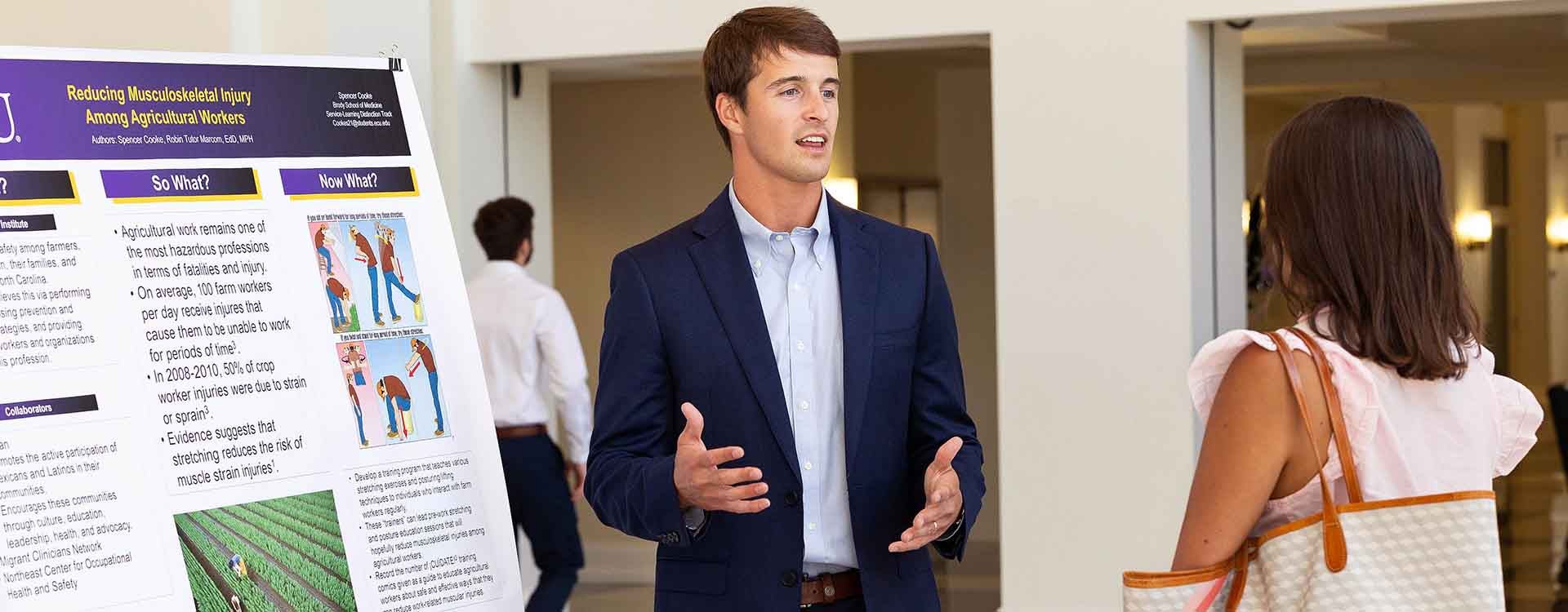Forum celebrates medical and dental student research, distinction track projects
East Carolina University medical and dental students in the Summer Scholars Research and distinction track programs showcased their scholarly work on Aug. 1 during the 25th Annual Medical Student Scholarship Forum at the East Carolina Heart Institute at ECU.
The forum, hosted by the ECU Brody School of Medicine’s Office of Medical Education, gave students an opportunity to present their work and posters to colleagues and guests.
The Brody School of Medicine offers four distinction track programs related to the core missions of the school: health system transformation and leadership, research, medical education and teaching, and service-learning. The programs began in 2015 to provide students the opportunity to independently pursue an area of interest that reflects the core values that led them to select a medical career. Since then, 229 students have been accepted into the distinction track programs and 152 students have completed all program requirements to graduate with distinction.

Felicia Branch, right, discusses her project during a poster presentation with Joshua Keku at the 25th Annual Medical Student Scholarship Forum. (Photos by Rhett Butler)
The Summer Scholars Research Program began in 1997 to address the lack of research training in medical education. Since then, participation has rapidly grown, with more than 427 students participating, including expansion to the ECU School of Dental Medicine. More than 226 students’ projects have resulted in national presentations and published manuscripts.
“The Summer Scholars Research Program has provided mentored research opportunities for medical students for 25 years,” said Dr. Kori Brewer, associate chief of the Division of Research in Brody’s Department of Emergency Medicine. “I feel fortunate to have had the opportunity to direct the program for 23 of those years and see students grow the skills they will use as future clinician scientists. The past few years have seen a huge increase in participation and have been particularly exciting.”
The forum has taken on an expanded virtual component as well, allowing students to showcase their projects on Twitter.
“As a result, our previous one-day symposium allows students to promote their work more broadly, receive feedback from experts outside of our institution, and represent BSOM to a nationwide audience,” Brewer said.
Second-year medical student Felicia Branch presented her project on chronic pain and identifying biomarkers that can be used to predict individual opioid responsiveness, potentially reducing and preventing the potential for opioid addiction in the long run.
“This topic of chronic neuropathic pain resonates with me as many members of my family and community struggle with pain management,” Branch said. “The opportunity to be a part of an initiative exploring therapies to better treat chronic neuropathic pain as well as reducing the potential for opioid exposure and addiction aligns with some of my personal goals as a future physician.”
Branch said the research experience and forum allowed her to explore her interests with mentorship and guidance.
“I believe research allows us to see how benchwork translates to medicinal therapy and practices in the clinical setting,” she said. “Understanding how things work on a molecular level allows us to better understand how to treat diseases in our future patients.”
Third-year medical student Spencer Cooke participated in the service-learning distinction track and presented “Reducing Musculoskeletal Injury Among Agricultural Workers.”
“My project is going to develop a training program and training guide who will go out into farm communities and teach these exercises to the workers and the goal is to prevent injury,” he said, adding that close to 100 farmworkers experience injuries per day and that the need for accessible and culturally appropriate interventions are required to make a difference in the prevention of these injuries.
Another aspect of the project he found important was the development of bilingual materials for migrant farmworkers.
“I minored in Spanish at UNC-Chapel Hill and I love speaking Spanish,” Cooke said, “and specially wanted to work with this population. This would be a great way to help that community.”

Spencer Cooke discusses his project during a poster presentation.